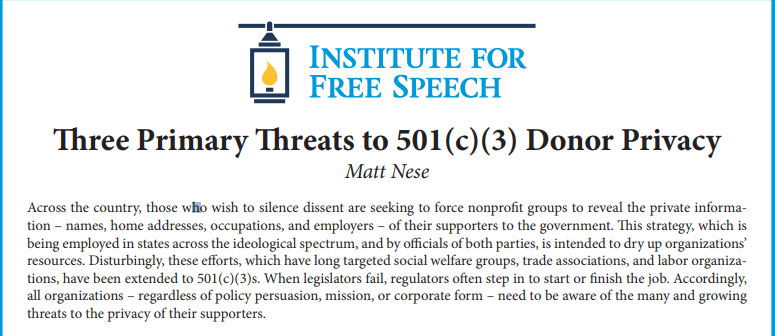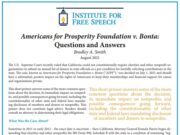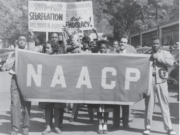Across the country, those who wish to silence dissent are seeking to force nonprofit groups to reveal the private information – names, home addresses, occupations, and employers – of their supporters to the government. This strategy, which is being employed in states across the ideological spectrum, and by officials of both parties, is intended to dry up organizations’ resources. Disturbingly, these efforts, which have long targeted social welfare groups, trade associations, and labor organizations, have been extended to 501(c)(3)s. When legislators fail, regulators often step in to start or finish the job. Accordingly, all organizations – regardless of policy persuasion, mission, or corporate form – need to be aware of the many and growing threats to the privacy of their supporters. This Issue Brief explains three primary threats to the privacy of donors to 501(c)(3)s and places current calls for increased disclosure in context.
Three Primary Threats
I. Overbroad “electioneering communication” definitions can force 501(c)(3)s engaging in issue advocacy or nonpartisan voter information activity to report their donors to the government.
Typically, “electioneering communication” (EC) statutes regulate speech that mentions candidates in a specified time period before an election. When groups speak in a manner that triggers regulation, they often are forced to file public reports containing the private information of their supporters. While existing EC statutes vary widely among states (Is just “express advocacy” covered or is issue advocacy also covered? What kinds of communications are covered? How many days before an election are communications regulated? Which donors need to be disclosed?), those states that currently lack such statutes are increasingly attempting to adopt them. Given the current climate, many of these proposals are hastily written, overbroad, and vague. Equally as troubling, many measures attempt to regulate issue speech and communications placed on the Internet or disseminated via electronic means.
In 2015 alone, policymakers in Arkansas, Minnesota, Montana, New Mexico, South Carolina, and Tennessee seriously considered legislation that would have created “electioneering communication” statutes, in ways that could or would have implicated the privacy of donors to 501(c)(3)s. Fortunately, only the Montana Legislature passed such a law in 2015. However, Colorado and Delaware already have similar statutes on the books that would force (c)(3)s to disclose some of their donors for speech about issues or for publishing voter guides, and the Institute represented 501(c)(3) clients in challenges to those statutes.
II. Some proposals creatively re-classify nonprofits as a new form of PAC, termed “incidental committees,” or mangle the “primary purpose” test, often trapping (c)(3)s in the process and subjecting them to donor disclosure requirements.
Other states forego the EC route in favor of legislative proposals that re-classify nonprofits as “incidental committees” (i.e. those groups that are only “incidentally” mention candidates and political issues and therefore can’t be regulated as full “political committees”). This incidental PAC status can trigger extensive reporting requirements. As such, these statutes can trip up nonprofits that speak about issues of public importance and may name a candidate (often an incumbent officeholder) in the process. Doing so can force these groups to make the private information of their supporters public. This is a particular danger for (c)(3)s with (h) elections, which may contribute to or speak about ballot measure campaigns. In the 2015 sessions, Montana and Washington lawmakers considered legislation that would force groups to disclose their donors based upon that type of speech. Fortunately, Washington legislators have, to date, been unsuccessful.
Other legislative measures (or regulations) ignore the “major purpose” test entirely or premise political committee status upon a small amount of political activity. Even worse, political activity is often defined broadly to include communications concerning issues of public importance, or that merely name candidates. The result is often a legal duty to register with the state and publicly disclose donors. Missouri and Texas legislators considered proposals of this nature in 2015, and an Arizona Citizens Clean Elections Commission rulemaking proposal, and potential ballot initiative, may function in a similar fashion. In another example, the Texas Ethics Commission adopted a 25% threshold for political committee regulation in 2014.
III. Don’t underestimate the actions of administrative officials, some of whom are becoming increasingly emboldened in requesting the unredacted donor lists of (c)(3)s, or regulatory bodies, which often have the power to write nonprofit donor disclosure rules with little oversight and even less scrutiny. Ballot measures on this topic are also a growing threat.
When legislative initiatives fail, those who wish to silence speech often pursue regulatory avenues to achieve nonprofit donor disclosure. Pending regulatory rulemakings in Arizona, Montana, and Texas may force (c)(3)s to publicly report the private information of their supporters, depending on whether they are enacted and how they are written. Similarly, there is a growing threat to nonprofit donor privacy on the ballot initiative front, with the possibility of concerning initiatives being submitted to voters in Arizona, Arkansas, and Maine as well as in numerous local jurisdictions.
Even more boldly, some states are opting to force (c)(3)s to disclose their donors by exploiting charitable solicitation laws. In California and New York, the Attorneys General are requiring nonprofits to submit an unredacted copy of their Form 990 Schedule B to the state in order to continue soliciting supporters. The Institute for Free Speech is currently involved in litigation against the State of California due to such a request. Other states, including, at least, Florida, Hawaii, Kentucky, and Mississippi arguably have laws on the books that would allow administrative officials in those states to similarly demand a nonprofit’s unredacted donor list.
A Note about Donor Disclosure
Contrary to many news reports and comments by those who wish to further regulate speech, the United States currently mandates more disclosure of political spending and contributions than at any time in its history. Given this extensive disclosure regime, it is a misnomer to speak of “undisclosed spending.” Rather, many nonprofit groups, often pejoratively labeled as “dark money” outfits by their critics, are well-known organizations that have long been engaged in advocacy or speech about issues of public importance. For those newer groups, a simple Google search of an organization’s name will provide information about a given group.
When individuals donate to a candidate, political committee, or political party, they know their contribution will be used to support or oppose candidates in some way. The same is not at all true of donors to all manner of nonprofit groups. Citizens give to these groups not because they agree with every position a group takes, but because on balance they think the group provides a voice for their views or otherwise advances their shared interests. To publicly identify contributing individuals with communications of which they had no advance knowledge, and to which they may even be opposed, is both unfair to members and donors, and misleading to the public. It is “junk disclosure” – disclosure that serves little purpose other than to provide a basis for official or private harassment, and that may actually misinform the public.
Conclusion
As public backlash against private giving grows – buoyed by a false media narrative and support from elected officials fearful of criticism – the threat to (c)(3) donor privacy increases, and the issue isn’t going away. Above all, nonprofits – and (c)(3)s especially – must be wary of this escalating threat. With each consecutive year, the chorus in support of these proposals rises louder and efforts to pass such measures grow stronger. Those who wish to silence nonprofits possess a long-term view of this undertaking. Although many measures have failed to date, enemies of debate continue to push their proposals session after session until they’ve gained majority support. As a result, all (c)(3)s must remain vigilant concerning these efforts in their state, and speak out about these proposals’ threat to First Amendment liberties.
https://www.ifs.org/wp-content/uploads/2015/06/2015-06-16_IFS-Issue-Brief_Nese_Three-Primary-Threats-To-501c3-Donor-Privacy.pdf














